How to Keep Your Pool Clean with 80% Fewer Chemicals (Scientifically Proven)
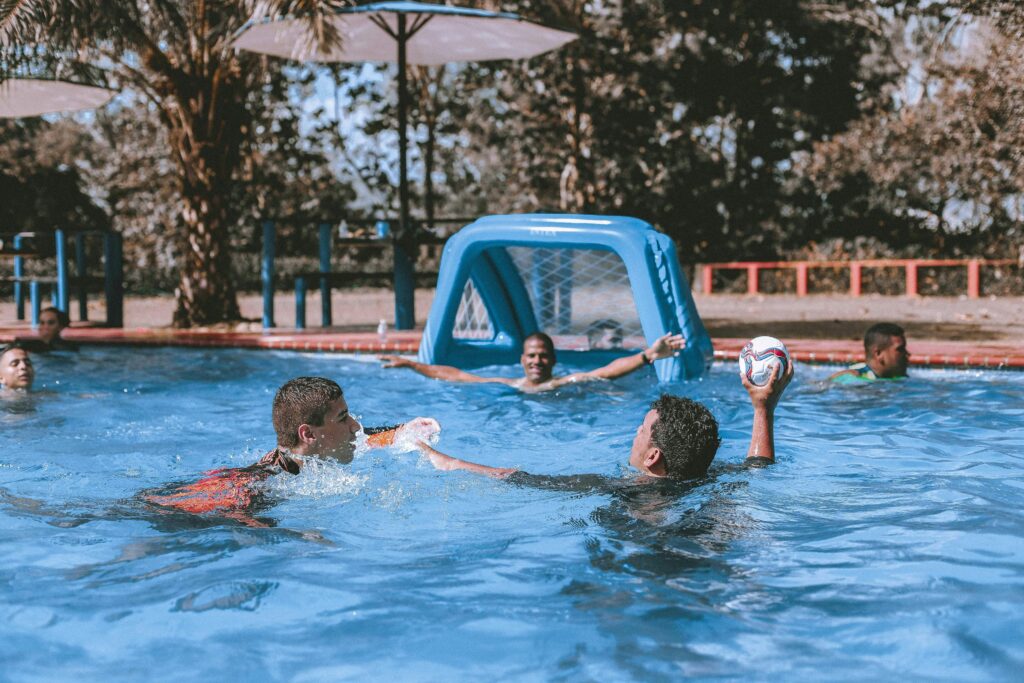
Owning a pool is a luxury, but maintaining it can be a challenge, especially when relying on harsh chemicals like chlorine. While chlorine is effective, it comes with downsides—skin irritation, eye redness, strong odors, and long-term health concerns.
What if you could keep your pool crystal clear while cutting chemical use by up to 80%? Thanks to mineral ionization technology, this is now possible. It provides a gentler, healthier, and more eco-friendly way to maintain your pool.
The Problem with Traditional Pool Chemicals
For decades, pool owners have relied on chlorine to sanitize their pools. While effective, excessive chlorine use creates several issues:
Skin, Eye, and Hair Irritation
High chlorine levels strip away natural oils, leading to dry skin, brittle hair, and red, irritated eyes. Many swimmers, especially those with sensitive skin or allergies, experience rashes, itching, and flakiness after prolonged exposure. Chlorine also affects hair, leaving it feeling rough and damaged, especially for those who color-treat their hair.
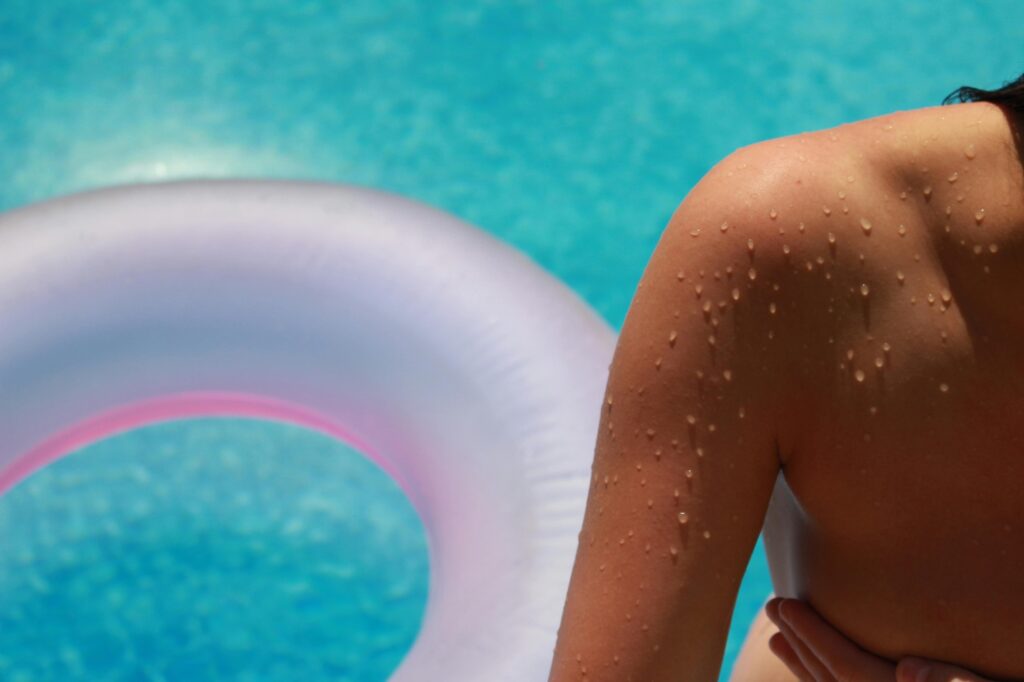
Strong, Unpleasant Odors
The “chlorine smell” in pools actually comes from chloramines, a byproduct of chlorine mixing with sweat, oils, and other contaminants. These cause respiratory irritation and make pool water feel harsh. Chloramines linger in the air, making it difficult for people with asthma or breathing conditions to enjoy the pool without discomfort.
Potential Health Risks
- Long-term chlorine exposure has been linked to asthma, allergies, and other respiratory issues.
- High chlorine levels can corrode pool equipment and damage swimsuits over time.
- Studies suggest that excessive chlorine exposure, especially in indoor pools, may contribute to lung damage and other long-term health concerns.
Environmental Impact
Excess pool chemicals can harm local ecosystems when water is drained, disrupting water pH and affecting aquatic life. Chlorinated water that enters natural water sources can kill beneficial bacteria and disrupt delicate ecological balances, affecting fish and other marine organisms.
Given these downsides, many pool owners are seeking a safer, more sustainable alternative.
The Science Behind Mineral Ionization
One of the most effective ways to reduce chlorine dependency is through mineral ionization, a proven technology that uses copper and silver ions to purify water.
How It Works
A pool ionizer uses electrodes made of copper and silver to release positively charged mineral ions into the water. These ions kill bacteria, viruses, and algae, providing long-lasting sanitation without the need for high chlorine levels.
- Copper ions act as a natural algaecide, preventing algae growth by disrupting its cell structure.
- Silver ions have antibacterial properties, eliminating harmful bacteria and viruses by attacking their DNA and stopping reproduction.
Unlike chlorine, mineral ions don’t evaporate under sunlight, meaning they keep working for longer with minimal maintenance. Even in high-traffic pools, ionization provides a consistent, effective way to keep the water clean.
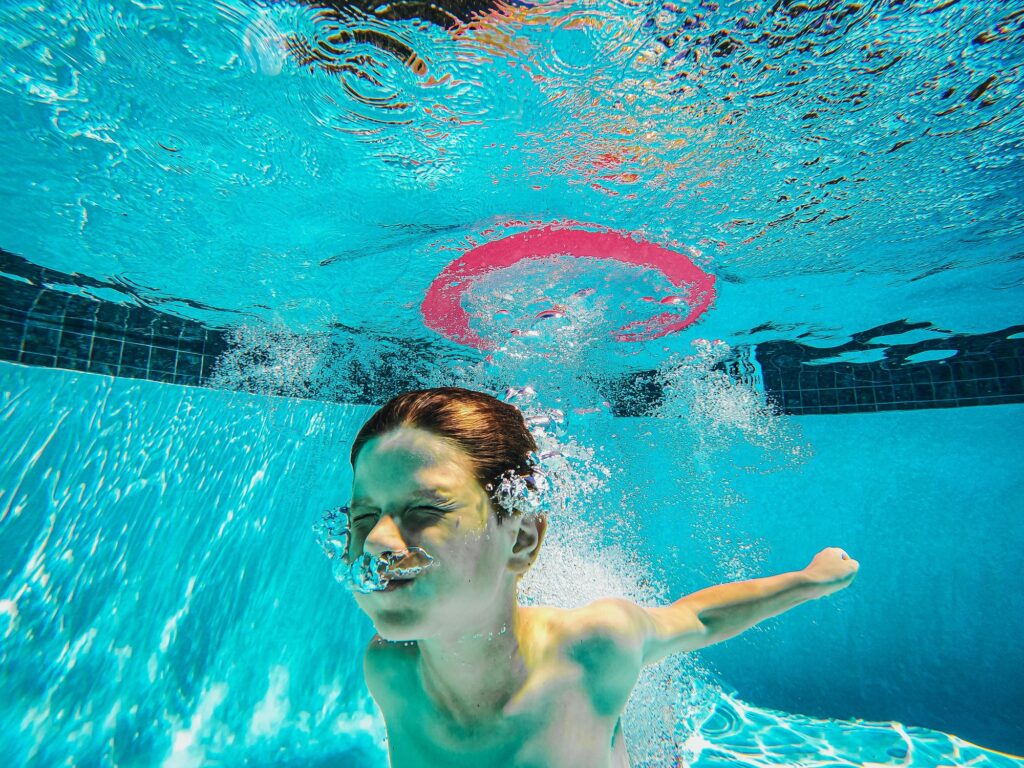
Why It’s More Effective Than Chlorine Alone
- Longer-lasting sanitation – While chlorine breaks down quickly, mineral ions stay in the water for continuous protection.
- Healthier for swimmers – No more harsh effects on skin, eyes, and hair.
- Lower costs – Less need for expensive chemicals like chlorine and algaecides.
- Gentle on pool equipment – Reduces corrosion of pool liners, ladders, and heating systems.
How to Reduce Pool Chemical Use by 80%
Install a Pool Ionizer
A pool ionizer connects to your pool’s filtration system, continuously releasing mineral ions into the water. It works with:
- Chlorine pools
- Saltwater pools
- Freshwater pools
Installation is quick and easy, and once in place, it immediately begins reducing the need for high chlorine levels. Most systems require little maintenance, apart from occasionally cleaning the electrodes to ensure optimal ion release.
Use an Oxidizer Instead of High Chlorine Levels
Since pool ionizers kill bacteria and algae, you no longer need large amounts of chlorine. Instead, you can use:
- Hydrogen peroxide – A powerful oxidizer that breaks down organic matter without harsh chemicals.
- Non-chlorine shock – Oxidizes contaminants without producing chloramines.
With this system, chlorine levels can be reduced to as low as 0.3–0.5 ppm (compared to the standard 2–4 ppm in traditional pools). Lower chlorine levels mean less irritation and a more natural swimming experience.
Maintain Proper Pool Chemistry
For optimal performance, pool water should have balanced pH, alkalinity, and calcium hardness levels.
- pH: 7.2 – 7.6 (Prevents scaling and corrosion)
- Alkalinity: 80 – 120 ppm (Helps stabilize pH)
- Calcium Hardness: 200 – 400 ppm (Prevents damage to pool surfaces)
Testing the water weekly ensures everything stays in balance. Imbalanced water chemistry can reduce the effectiveness of the ionizer, so it’s important to keep these levels within range.
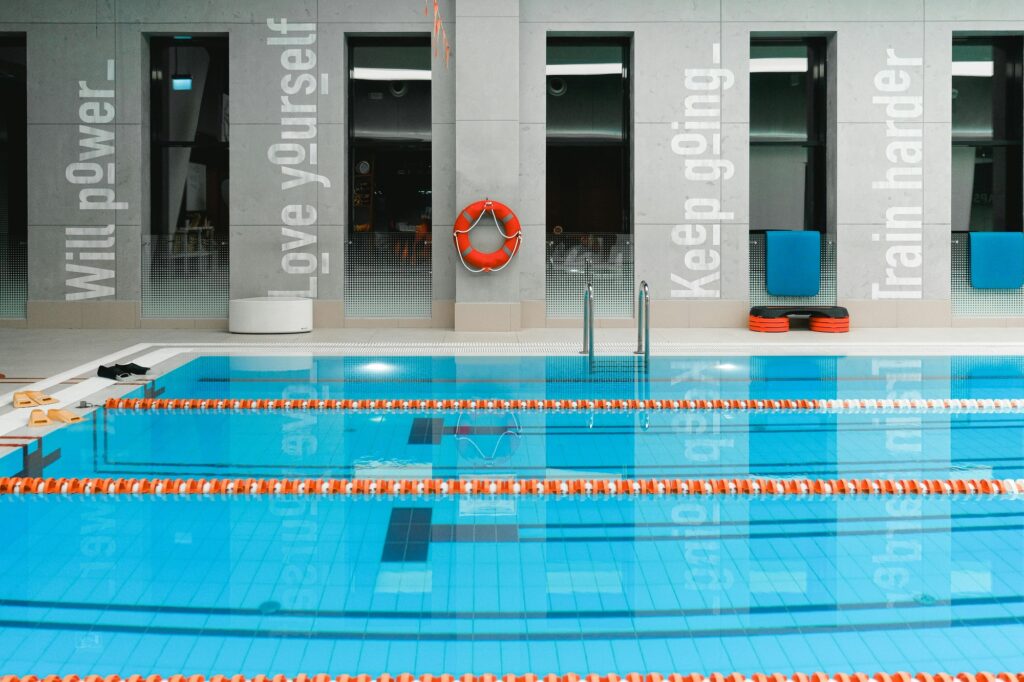
Use a Pool Cover to Reduce Contaminants
A solar pool cover prevents leaves, dirt, and organic material from entering the pool, reducing the workload on sanitizers and minimizing chemical use.
- Helps maintain water temperature, reducing heating costs.
- Reduces water evaporation, lowering the need for refilling and additional chemicals.
- Prevents algae growth by blocking sunlight, which algae need to thrive.
Keep Your Filtration System Clean
A well-maintained pool filter removes debris and contaminants, reducing the need for excess chemicals.
- Sand filters – Backwash every 1–2 weeks.
- Cartridge filters – Clean every 3–4 weeks.
- DE filters – Backwash and recharge monthly.
With proper filtration and ionization, chemical use can be significantly reduced. Many pool owners find that after switching to an ionizer, they only need to shock their pool once a month instead of weekly.
Do Pool Ionizers Actually Work?
Many pool owners who switch to mineral ionization report:
- Clearer, softer water – No more chlorine irritation.
- Minimal algae growth – Thanks to copper ions.
- Lower maintenance costs – Less need for chlorine, algaecides, and shock treatments.
- Longer-lasting pool equipment – Less chemical corrosion on liners, heaters, and ladders.
How Mineral Ionization Compares to Saltwater Pools
Many pool owners consider saltwater pools as an alternative to traditional chlorine pools. However, while they reduce some issues associated with chlorine, they still generate chlorine through electrolysis.
Key Differences Between Ionization and Saltwater Systems:
- Saltwater pools still produce chlorine – They simply generate it from salt instead of adding it manually. Mineral ionization reduces chlorine use by up to 80%.
- Less corrosion with ionization – Saltwater is highly corrosive, causing damage to pool heaters, metal fixtures, and deck surfaces over time.
- Better for skin and hair – While saltwater pools feel softer than chlorine pools, they still contain chlorine, which can cause irritation and dryness. Mineral ionization eliminates this problem.
- Lower maintenance with ionization – Salt cells require regular cleaning and replacement, while ionizers need minimal upkeep.
If you’re looking for a truly low-chemical, low-maintenance pool, mineral ionization is the superior choice.
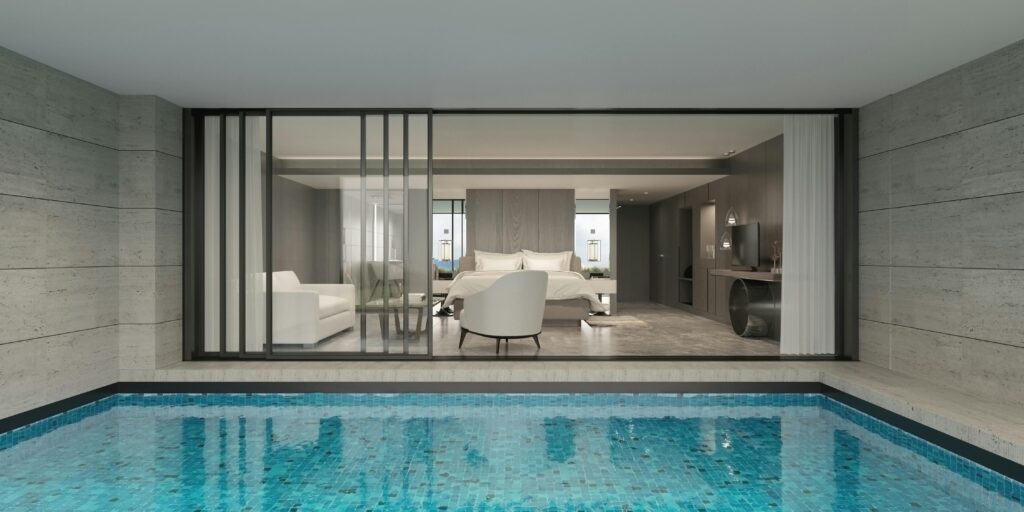
Frequently Asked Questions About Pool Ionizers
1. Do I still need chlorine if I use a pool ionizer?
Yes, but at much lower levels. With a ClearBlue Ionizer, chlorine levels can be reduced to 0.3–0.5 ppm, compared to the typical 2–4 ppm in traditional pools.
2. How long does a pool ionizer last?
The electrodes in an ionizer typically last 2–5 years before needing replacement. The system itself can last a decade or more with proper maintenance.
3. Will a pool ionizer turn my water green?
No. When used correctly, mineral ionization prevents algae growth. If the water turns green, it’s likely due to improper pH or alkalinity levels, not the ionizer itself.
4. Can I use a pool ionizer with a hot tub?
Yes! Pool ionizers work in hot tubs and spas, providing softer, cleaner water with fewer chemicals.
5. How long does it take for an ionizer to start working?
Most pools show improvements in clarity within a few days, and after 2–3 weeks, chemical use can be significantly reduced.
The Best Pool Ionizer Brands to Consider
If you’re ready to switch to a low-chemical pool, here are some top-rated pool ionizer brands:
ClearBlue Ionizer
- Uses advanced copper-silver ionization for maximum efficiency
- Works with all pool types (chlorine, saltwater, freshwater)
- Low maintenance – Requires minimal cleaning
- Backed by scientific research and customer reviews
Each of these systems offers significant chlorine reduction, providing a healthier, more natural swimming experience.
Environmental Benefits of Pool Ionization
In addition to offering a healthier swimming experience, mineral ionization provides notable environmental benefits. Traditional pool chemicals, particularly chlorine, have a lasting impact on the environment, especially when pools are drained. Chlorine and other chemicals can contaminate local water sources, disrupt ecosystems, and harm wildlife. By reducing your reliance on harsh chemicals, you’re contributing to the health of local flora and fauna.
How Ionization Helps the Environment:
Less Chemical Runoff: By significantly reducing chlorine use, mineral ionization minimizes the release of harmful substances into the environment.
Safer Water Disposal: When it’s time to drain your pool, ionized water is less harmful to aquatic ecosystems, reducing the likelihood of contaminating nearby water bodies.
Eco-friendly Pool Equipment: Many ionizers are built with environmentally-conscious materials, and the long-lasting electrodes mean fewer replacements, resulting in less waste.
Cost Savings with Mineral Ionization
Maintaining a pool can be expensive, especially when it comes to purchasing chemicals like chlorine, algaecides, and shock treatments. Mineral ionization technology not only reduces your chemical costs but also saves you money in other areas of pool maintenance.
How Ionization Cuts Costs:
Reduced Chemical Purchases: By cutting your chemical use by up to 80%, you’ll spend less on chlorine, algaecides, and other pool chemicals.
Lower Energy Bills: Some pool ionization systems, like the ClearBlue Ionizer, help reduce water evaporation, which can lower pool heating costs.
Longer Equipment Lifespan: With less harsh chemicals, your pool equipment—such as pumps, filters, and heaters—will experience less corrosion, reducing the need for costly repairs or replacements.
Fewer Pool Service Calls: With ionization, your pool will require less frequent servicing, saving you on professional cleaning and maintenance costs.

How to Maintain Optimal Performance with a Pool Ionizer
While pool ionizers require minimal maintenance, ensuring they work effectively is essential for maximizing the reduction in chemical use and maintaining a healthy swimming environment. Below are some essential tips for maintaining your ionizer system:
Essential Maintenance Tips:
Clean the Electrodes Regularly: Most ionizers require occasional cleaning of the electrodes to ensure they continue to release minerals into the water efficiently. Check the manufacturer’s instructions for specific guidelines.
Monitor Water Chemistry: Even with reduced chemical use, maintaining proper pH, alkalinity, and calcium hardness levels is crucial to prevent scaling and ensure the ionizer works optimally.
Replace Electrodes as Needed: The electrodes in a pool ionizer will naturally wear out over time, typically lasting between 2–5 years. Be sure to replace them as recommended to maintain the system’s performance.
Check the Pool Filter: While ionizers help reduce chemical use, your pool’s filtration system still plays a critical role in keeping the water clean. Regularly backwash or clean your pool filter to ensure it’s operating at peak efficiency.
Testimonials: Pool Owners Share Their Experiences
Many pool owners who have switched to ionization technology have noticed significant improvements in their pool’s cleanliness, maintenance, and overall experience. Here are a few testimonials from satisfied ClearBlue Ionizer users:
Sarah from California: “I was tired of the strong chlorine smell and dry skin after swimming in my pool. Since switching to the ClearBlue Ionizer, my pool is not only crystal clear, but I feel great after swimming. My skin is softer, and I no longer have to worry about itchy eyes. It’s truly a game-changer.”
Michael from Texas: “I’ve been using a pool ionizer for over a year now, and the results have been outstanding. My pool is cleaner than ever, and I’ve saved so much money on chemicals. Plus, the environmental benefits make me feel good about the switch. I highly recommend it.”
The Future of Pool Maintenance is Ionization
As pool owners increasingly seek safer, healthier, and more sustainable ways to maintain their pools, mineral ionization stands out as the solution of the future. By reducing the need for harsh chemicals like chlorine and offering a more eco-friendly option, ionization technology not only improves water quality but also enhances the overall swimming experience.
Switching to a pool ionizer, like the ClearBlue Ionizer, offers:
- A cleaner, healthier pool with fewer chemicals
- Softer water for your skin and hair
- Long-term savings on pool maintenance and chemicals
- Environmental sustainability by reducing harmful runoff
If you’re ready to take your pool maintenance to the next level, consider investing in a mineral ionization system and enjoy a cleaner, greener, and more enjoyable pool experience for years to come.


